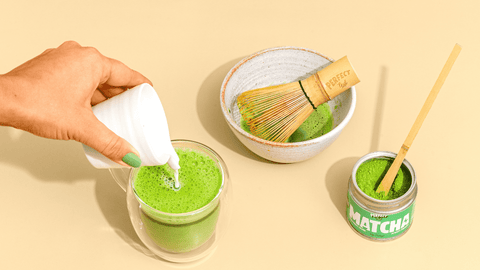
We can remember sitting in our office back when we were working in finance, looking for an alternate solution to the insane amounts of coffee we were drinking.
Matcha was top of our list, but the options on the market were slim at the time, and we didn't have a great experience with some of the products and matcha powders that we tried. They made us feel nauseous and unwell.
For us, this came down to only having access to low-quality matcha powder that our stomachs didn't agree with (it made our stomachs hurt almost as bad as coffee!).
High-quality matcha powder shouldn't make you nauseous, but experiencing nausea when consuming it is often due to a few factors related to how you use it and where you source your powder. The following advice may stop you from feeling worse for wear after drinking a matcha latte:
Avoid Drinking Matcha on an Empty Stomach
Matcha contains an antioxidant known as Tannins. Tannins have a range of benefits, from fighting inflammation to helping balance blood sugar levels but can also irritate your natural digestion due to their interference with enzyme function.
Consuming matcha green tea on an empty stomach can temporarily raise stomach acid levels in our bodies and upset our stomach lining. Despite higher quality matcha powder having less astringent tannins, we all react differently to the same amount of exposure.
Pair your matcha intake with a light meal or a non-dairy drink. Or better yet, give our Matcha Energy Drinks a try.
Don’t Use Too Much Matcha in One Go!
In our experience, using too high of a dose of matcha powder is the most common cause for feeling unwell after use, especially if consumed on an empty stomach.
We recommend using 1 tsp of PerfectTed matcha powder with each beverage.
Using too much matcha in one serving will make you feel even worse if you're using lower quality matcha, as you are likely consuming additional Tannins and other substances that your body may immediately reject.
Matcha Tea Side Effects: Don’t Drink Low-Quality Matcha
We may have mentioned this already...
But low-quality matcha is the devils' drink. Obtaining your matcha powder from unreliable, untested sources can make or break your matcha experience. Seriously, we learned the hard way.
Aside from the above reasons, there are two further potential reasons why drinking matcha could leave you feeling unwell.
- Potential contamination of ingredients
- Lack of radiation testing
- High levels of filler - such as Maltodextrin
Contamination can cause multiple side effects and general unwellness, with many contaminants going unnoticed or unrecognised. One major contaminant is lead. Chinese brands have been shown to exceed the lead limit in their tea products by over 32%.
No joke - take a look at the research.
Continuing the trend of checking for foreign substances is testing matcha powder for traces of radiation. Since 2011, radiation testing has been essential for ensuring the green tea leaves used in matcha are radiation-free. Since we use the whole leaf in matcha, irradiation is a top priority.
Unfortunately, purchasing through unreliable vendors can mean this important quality-control check is missed.
Finally, high filler levels can cause your matcha to taste off, bitter, and make you feel unwell. Some brands have used Maltodextrin as a filler to add more weight to their matcha. We don't want this carbohydrate in our body full stop, especially when it's removing the goodness that's in matcha.
In short - only buy from reputable sources and not from the shady link you found for 50% off on Amazon.
For your safety and optimal matcha consumption experience, we feel obliged to point you in the direction of our 100% organic, single-origin, and ceremonial grade matcha, made from the freshest shade-grown hand picked green tea leaves in Uji, Japan. You'll be praising the matcha gods that you found a product this good.


